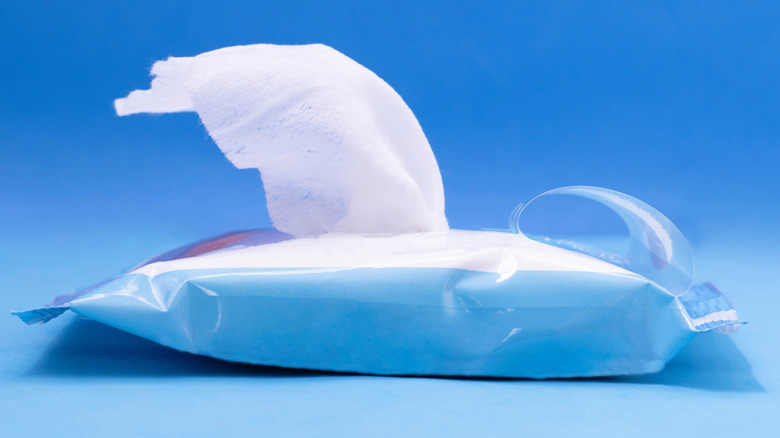How To Know If Your Feminine Wipes Are Safe
You may be using feminine wipes when you're on period, after hitting the gym, or during travel to keep your lady parts fresh. These products are designed to cleanse and moisturize the delicate skin in your private areas, neutralize odors, and prevent microbial growth. A 2008 study published in the Journal of Reproductive Medicine found that feminine wipes increased skin moisture in postmenopausal women within four weeks. Their potential benefits depend on the ingredients used.
However, many gynecologists say that intimate wipes are unnecessary and can even be harmful. For example, OB/GYN Dr. Traci Johnson told WebMD that she only recommends using a mild, natural soap and water. "The vagina is like a self-cleaning oven," she told the source. As far as its scent goes, some vaginal odor is normal. "What women need to watch out for is a change in their vaginal odor. If it smells unpleasant, and the odor changes over time, talk to your doctor," said researcher Dr. Elizabeth Boskey in an interview with Shape. She also points out that it's okay to use feminine wipes occasionally — just make sure you choose a product without alcohol, perfumes, or glycerin, as these ingredients can irritate and dry out your skin.
As you would expect, not all brands are created equal. Feminine wipes may contain potentially harmful chemicals and allergens, such as benzene and parabens. Ideally, look for products with as few ingredients as possible.
Why you should think twice before using feminine wipes
The US Food and Drug Administration classifies intimate wipes as cosmetics, so they fall under different regulations than medications. Some may contain parabens, fragrances, or substances that release formaldehyde, according to Women's Voices for the Earth. Over time, these compounds can affect your hormones, cause skin irritation, or increase cancer risk. Clinical research supports these claims — a 2020 study published in Environment International was conducted on 79 feminine hygiene products, including wet wipes. Researchers found that 83% contained benzene and 50% had 1,4-dioxane in their composition, and all products contained volatile organic compounds (VOCs).
Benzene, a chemical in feminine wipes and other products, is a human carcinogen, per the American Cancer Society. In clinical trials, this solvent has been shown to increase the risk of leukemia and skin reactions. The same goes for 1,4-dioxane, an organic compound that may contribute to cancer, among other side effects (per the US Environmental Protection Agency). Another study, which was published in Environment International in 2020, found that feminine hygiene products contain hormone-disrupting chemicals that can be absorbed into the skin.
What's more, feminine wipes may double the risk of urinary tract infections, reports a 2018 study published in BMC Women's Health. Feminine washes and gels had similar effects. Given these risks, the best thing you can do is to stop using these products altogether. If that's not an option, you can try to reduce their usage.


